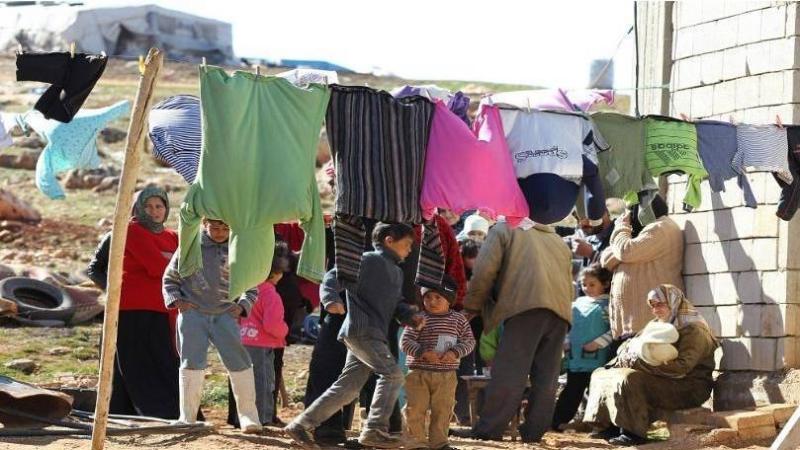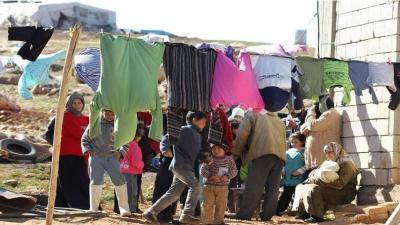It can be said that Lebanon is heading to the Brussels conference with its ministerial delegation like a soldier going into battle unarmed. The reason is the inability of successive Lebanese governments, leading up to the current one, to agree on a clear, unified plan with specific timelines, stemming from Lebanon's deteriorating ability to bear the presence of Syrian refugees for an extended period.
The meeting chaired by President Michel Aoun yesterday, attended by Foreign Minister Abdullah Bou Habib, Minister of Social Affairs Hector Hajjar, representatives of the government presidency, and others, was dedicated to discussing the Lebanese position that will be communicated during the Brussels conference, which involves representatives from governments, international and regional organizations, and civil society organizations. The outcome was merely "explaining water with water."
So what will the Lebanese delegation take to Brussels? A ministerial source told "Nidaa Al-Watan" that "what the delegation will carry is essentially the same previous rhetoric and more lamentation over past glories, summarized as follows:
First: Lebanon has become a refuge for Syrians, Palestinians, and individuals of other nationalities, with a population density of 600 individuals per square kilometer, unprecedented anywhere in the world. Lebanon has sought at various levels with international organizations, the UN, and visiting international delegations to facilitate the return of Syrians to their homeland, but unfortunately our calls have gone unheeded. We have no funds, and Lebanon is economically shattered and unable to cope.
Second: Western countries and the United Nations must understand that Lebanon can no longer bear more than it has endured. You must comprehend the seriousness of the situation and the delicateness of what we are saying. We renew our request to the United Nations and its affiliated institutions, as well as all organizations and associations providing assistance to Syrian refugees, that aid be provided to Syrian refugees in their own country while we expedite their return. This measure will encourage them to rush back immediately, and it is unfortunate that they remain here, drawing these aids to the extent that we have begun to doubt the presence of bad intentions towards Lebanon. Syria has become safe in a significant portion of its territory, while other countries hosting refugees are receiving assistance worth billions of dollars. According to a report from the International Monetary Fund, Lebanon has so far incurred a cost of 47 billion dollars to care for these refugees, not including the aid they receive from international organizations. How can we accept this situation to continue while Lebanon is experiencing an economic crisis and its people are starving with no one to care?
You must move quickly because Lebanon can no longer withstand the pressures from Western countries to keep refugees on its soil.
Third: We are faced with a dangerous situation that cannot continue, and it is unacceptable for this chaos to persist with a large number of Syrian refugees who are able to return to their country. We had previously reached an understanding with the Syrian leadership on the voluntary return of refugees, and 500,000 refugees returned. However, it has become evident that some of these individuals were returning to Lebanon to collect international aid, only to return to their homeland once again every month, and some are even trafficking the aid distributed to refugees. When we raised this issue, we stated that every injured and wounded individual is welcome in Lebanon for treatment, but for the rest, there is no justification for their continued presence in Lebanon.
Yet, the Lebanon that is set to address the world in Brussels is unable to communicate with Syria to repatriate part of its people. Minister Bou Habib's remarks after the meeting in Baabda indicate the impotence of the measures, as he said, "There is no understanding with the Syrians, but it is their duty to take people from their own country. Many Syrians travel to Syria taking their money with them because in Syria, dollars or Lebanese lira cannot be used; they must be exchanged, and a large portion of hard currency is leaving Lebanon for there. This is legal, and we do not claim it is illegal. We know that the international community—who is the international community? It is not Africa but Europe and the United States—does not want the refugees to return to their countries. And we can no longer prevent them from migrating by sea; we do not have this capability, so what happened a week ago? We cannot take on this kind of responsibility again. Will they help us compensate the people? Last week, we asked the international community to provide us with mechanisms capable of reaching 400 meters deep into the sea, yet to this day, we have not received a response. Does the international community care about Lebanon's interests? No, Lebanon's interests matter only to the Lebanese, not to the international community, which cares about its own interests, just as Europeans prioritize their own interests over those of Lebanon."
As for the justification given for Lebanon's inability to pursue the same path taken by Turkey in returning one million Syrian refugees, Minister Bou Habib's response was even less acceptable, stating, "Lebanon cannot do what Turkey does, especially since Turkey occupies Syrian lands where it can build houses. Lebanon cannot do that. Syria does not agree, and Lebanon does not occupy Syrian land, nor does it have this kind of hostile relations with Syria." In his remarks, there is a justification for Turkey's occupation of Syrian lands and a rationale for the continued stay of refugees in Lebanon, which contradicts what Lebanon will demand in Brussels.




